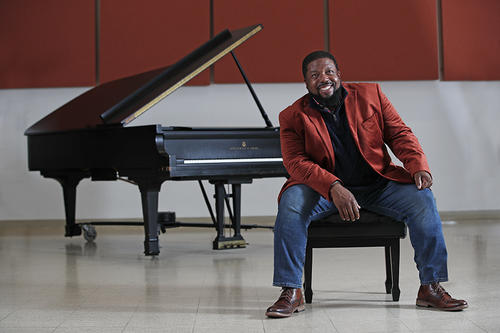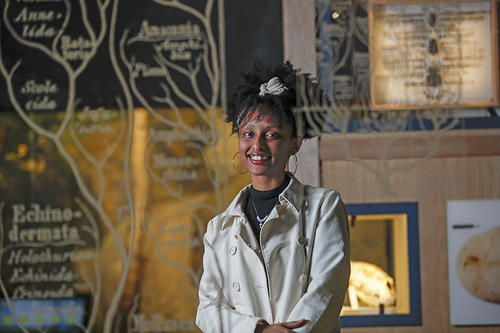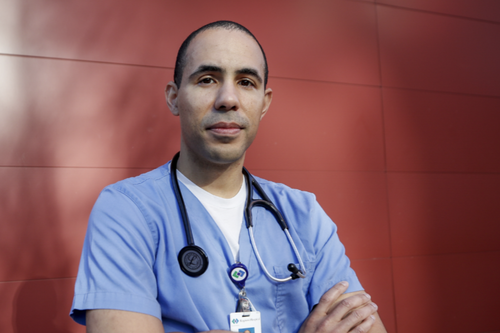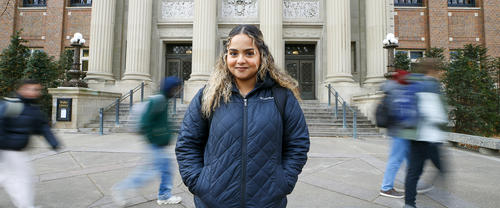
Finding her place
As a first-generation student, Yusra Hassan felt out of place during her first year at the University of Minnesota.
Hassan’s parents emigrated from Sudan before she was born, but they didn’t have higher-ed experience in the United States. She is also very close with her family, so leaving home was challenging. But that all changed when she began to seek out opportunities and get involved with student government.
Now, with a degree in political science and a double minor in African American & African studies and global studies from the College of Liberal Arts (CLA), Hassan is ready for her next step.
In her own words, Hassan tells of her experience at the U of M and her plans after graduation.
The culture of Sudanese people is very family and community oriented. Your closest friends are your neighbors, your family, and so leaving (Rochester, MN) was the most terrifying thing for me. My best friends are my cousins … we have grown up together. When we first came to America, we lived in the same house. And I think I had imposter syndrome, where I thought, “Am I supposed to be here?” I knew a lot of people were very proud of me, and I worked really hard, and even I was like, “Wow, I got into the U!” But I struggled.
As a first-generation student, Hassan felt like she was at a deficit when it came to understanding and navigating college life.
I think a lot of people get to college and say, “I want to join this, I want to do this.” And they just had this prior knowledge. I didn't know how to navigate it.
So I asked myself, “Am I struggling because I shouldn't be here, or am I just struggling because I'm a first-generation student and no one has told me these things, and I just need a little time? Or maybe I need to get out of my own head and ask for help?”
Reflecting on her parents and what they’d done for her drove her to take action.
My parents were so proud of me to be at the University of Minnesota. And part of that is because it came full circle for them. Pro bono lawyers at the U of M Law School helped them with their naturalization process. And so when I was moving into the dorms, they'd say, “Oh, I remember we would go here and have coffee with the lawyers.” My (three) siblings and I didn't understand who these people were. Our parents would say, “We have a meeting with these people,” and we would go run around a coffee shop and probably be annoying to everyone.
But to my parents, it was the most important thing ever, it was like everything they worked for was paying off. And I also worked hard to get here. So I asked, “How can I make this a better experience?
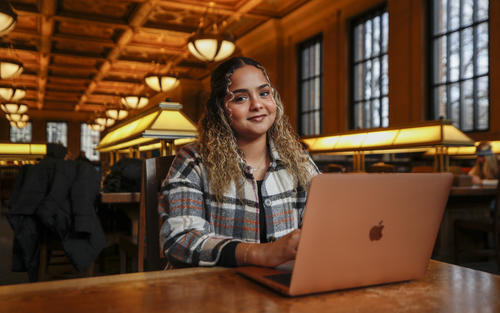
College should serve as the opportunity for those students to foster their desire to learn and improve their lives, not to feel left out and misplaced.
Hassan became active in Undergraduate Student Government, where she successfully advocated for more prayer spaces on campus and reached out to marginalized groups. And she joined the CLA Equity Policy Lens Committee, reviewing policies for potential inequities.
I decided to attend a lot of the first-year student events and to see what student groups were available. When I would meet people, I would ask, “What are you involved in?” I basically just decided to take my experiences, to see how I'm probably not alone, and push myself to find ways to improve aspects of my college experience that I felt were not inclusive or could be inaccessible to BIPOC or first-generation students.
I started to realize that there were a lot of opportunities for improving the University to foster a more welcoming environment for all students, especially those navigating the barriers of systemic inequalities. College should serve as the opportunity for those students to foster their desire to learn and improve their lives, not to feel left out and misplaced.
Her coursework further centered her sense of place in the world and the direction that she wanted her life to take.
I found really interesting classes that allowed me to learn about issues in Sudan—political, authoritarian politics that actually were contributing to the issues of why my parents left. Those courses were affirming to me, like, “Oh, they're talking about where my family is from, and people in situations that were impacting my family, and that continue to impact my family. There's so much oppression around the world and so many things where people have real difficulties. And part of being the daughter of an immigrant is to always be thinking about how you just kind of got lucky that your parents left at the time they did. My story could have been different.
After graduating this past December, Hassan plans to attend law school to pursue a career that will give her the skills to advocate for those who cannot advocate for themselves.
I have a desire to take my privileges … and to use that for good, to use that to advocate for others who don't have it. I want to start my career as an immigration lawyer, but long-term I want to get into diplomacy. I'd love to be a diplomat or an ambassador because I think the world needs it. The world needs some peace, and we need to know how to talk and work with other people.
